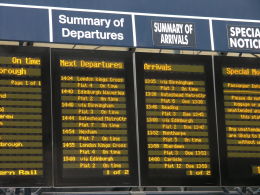Posted 28th June 2010 | 5 Comments
ATOC calls for complete rethink of rail spending plans

THE Association of Train Operating Companies is calling for a major review of rail spending plans, including the projects which are included in Network Rail's 2009-2014 Control Period. It is also warning that project deferrals or even cancellations cannot be ruled out.
ATOC said there should be a ‘swift and rigorous’ review of existing rail investment commitments 'to ensure that money is being spent in the best interests of passengers and taxpayers and in a way that helps to put the railways on a stable long-term footing'.
The Association has written to rail minister Theresa Villiers urging a review of all plans, including the £8bn which was to be invested by Network Rail in improving the network between now and 2014.
It said that 'all projects should be judged more closely on whether they will improve services for customers and increase revenue by attracting extra passengers to the railway, thereby reducing the cost to the taxpayer. The priority and viability of every scheme should be decided upon on the basis of a strong business case. Projects that do not measure favourably against this should be the first in line for deferral or cuts'.
The letter also points out that smaller, targeted projects that focus on specific pinch points can often produce tangible benefits for passengers and provide good value for money.
ATOC is proposing that train companies join the Department for Transport and Network Rail in jointly reviewing infrastructure projects, with a view to completing this in good time for the Spending Review in the Autumn. It also looks forward to the operators being part of the reappraisal of rolling stock procurement which Philip Hammond, the Transport Secretary, announced earlier this month.
ATOC chief executive Michael Roberts said: “Investment in Britain’s growing railway is vital if the current record levels of performance and customer satisfaction are to keep pace with demand which is expected to double in the next 20 years.
“But the cost of the railways to the taxpayer is too high, particularly at a time when public spending is under such severe pressure. It is our shared responsibility, across the industry and with the Government, to put rail on a more stable and sustainable footing.
“Train companies still believe firmly that the system of planning rail finance and projects over multiple-year periods is vital to sound long-term planning. But the unprecedented situation in the public finances means that, on balance, a swift and rigorous review is in the best interests of taxpayers, passengers and the railway.
“Train companies believe that they can work with their partners to give greater priority to projects with strong commercial justification and to review the scope of projects to improve their rate of return. Schemes that cannot demonstrate significant benefits to passengers and taxpayers should be the first in line for deferral or cuts."
Reader Comments:
Views expressed in submitted comments are that of the author, and not necessarily shared by Railnews.

Tom, London
The electrification projects have shown that they have a demonstrably strong business case. Any delay to these would be scandalous when we should have electrified all our trunk routes in the 60s and 70s like every other western European nation.
Peter Egan, Artarmon (Sydney), Australia
As in Australia, the cost of rail projects in the UK on a per kilometre basis has risen dramatically. While we don't want poor civic landscapes or blighted rural landscapes, we need to cut the scope of rail projects that continually seek to dominate the landscape - it adds to costs.
First on the agenda should be eliminating terminal rail stations. High Speed 2 should start as two tracks branching from High Speed 1 going to four through platforms underneath St Pancreas International then taking a suitable corridor to Heathrow's proposed rail interconnection point. Euston does not need to be developed for High Speed Rail.
Heathrow should be connected by high speed rail to the Continent to reduce demand for connecting flights onto European cities.
Few travellers from destinations north or west of London will have a final destination near Euston. UK-only high-speed trains should be turned around at Ebbsfleet and Ashford. Doing this enhances high-speed travel options and cuts development costs.
The UK should look to eliminate terminal platforms in favour of through platforms.
Graham, York, UK
I don't get ATOC's point here. The Transport Secretary has already commenced a review of Network Rail's costs to see if we are getting value for money and all existing projects have already been subject to a cost-benefit study (as Dominic says).
Some important projects have already been hit by cuts eg station improvement programme, so for goodness sake let's get on with the others - no more excuses for delay please!
Mike, Crewe, UK
Does ATOC not beleive that the content of the Network Rail business plan and investment programme for CP4 are already in the "best interests of taxpayers, passengers and the rail industry"? Or is this a poor attempt to deflect attention from the prospect of significant fare increases in the future, which perhaps ATOC would prefer didn't get too much limelight?
Dominic, Manchester
This is all very well, but projects such as electrification of the GWML and the Manchester-Liverpool line have already demonstrated that they provide a very high cost-benefit ratio. Reviews that simply introduce delays to projects such as these will only add to the cost.